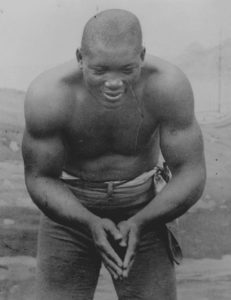
Jack Johnson
*Jack Johnson was born on this date in 1878. He was a Black Boxer and America's first Black heavyweight boxing champion.
John Arthur (Jack) Johnson, from Galveston, Texas, quit school after the fifth grade and became interested in boxing while working as a janitor at a local gymnasium. He turned professional in 1897. In 113 fights, he lost only eight over the next 35 years. He is still considered one of boxing's greatest counterpunchers of all time. A 1903 victory over "Denver Ed" Martin established Johnson as the unofficial Black heavyweight champion. Because of America's Jim Crow Laws and segregation, white boxers John L. Sullivan and Jim Jeffries refused to fight Johnson, claiming that to do so would sully the sport’s reputation.
On December 26, 1908, finally allowed to compete for the heavyweight championship in a fight in Sydney, Australia, Johnson dethroned the reigning champion, Tommy Burns. Johnson defended his championship against five white fighters over the next two years. Responding to the call of legions of white fans anxious to restore boxing’s traditional racial hierarchy, Jim Jeffries came out of retirement to challenge the Black champion. Billed as "The Great White Hope," Jeffries fought Johnson in "The Fight of the Century" on July 4, 1910, in Reno, Nevada. Johnson soundly beat Jeffries.
In 1913, Johnson was convicted of violating the Mann Act, which forbade transporting women across state lines for immoral purposes. The fact that he was married to a white woman was deemed sinful. Johnson fled the United States for France to avoid serving a prison term. Johnson supported himself during his exile in France by conducting boxing and wrestling exhibitions. He returned to competitive boxing in Havana, Cuba, in April 1915, losing his heavyweight title to Jess Willard. After serving a year in prison upon his return to the United States in 1920, Johnson spent the rest of his life writing, appearing in boxing exhibitions, and managing a series of business enterprises.
Jack Johnson was a controversial symbol of racial tensions in early twentieth-century America. Johnson died in an automobile accident in Raleigh, North Carolina, on June 10, 1946. He was inducted into the International Boxing Hall of Fame in 1990.
Boxing Album: An Illustrated History
by Peter Brooke Bell
Smithmark Publisher, 1995
ISBN 0831748109
The African American Atlas
Black History & Culture an Illustrated Reference
by Molefi K. Asanta and Mark T. Mattson
Macmillam USA, Simon & Schuster, New York
ISBN 0-02-864984-2